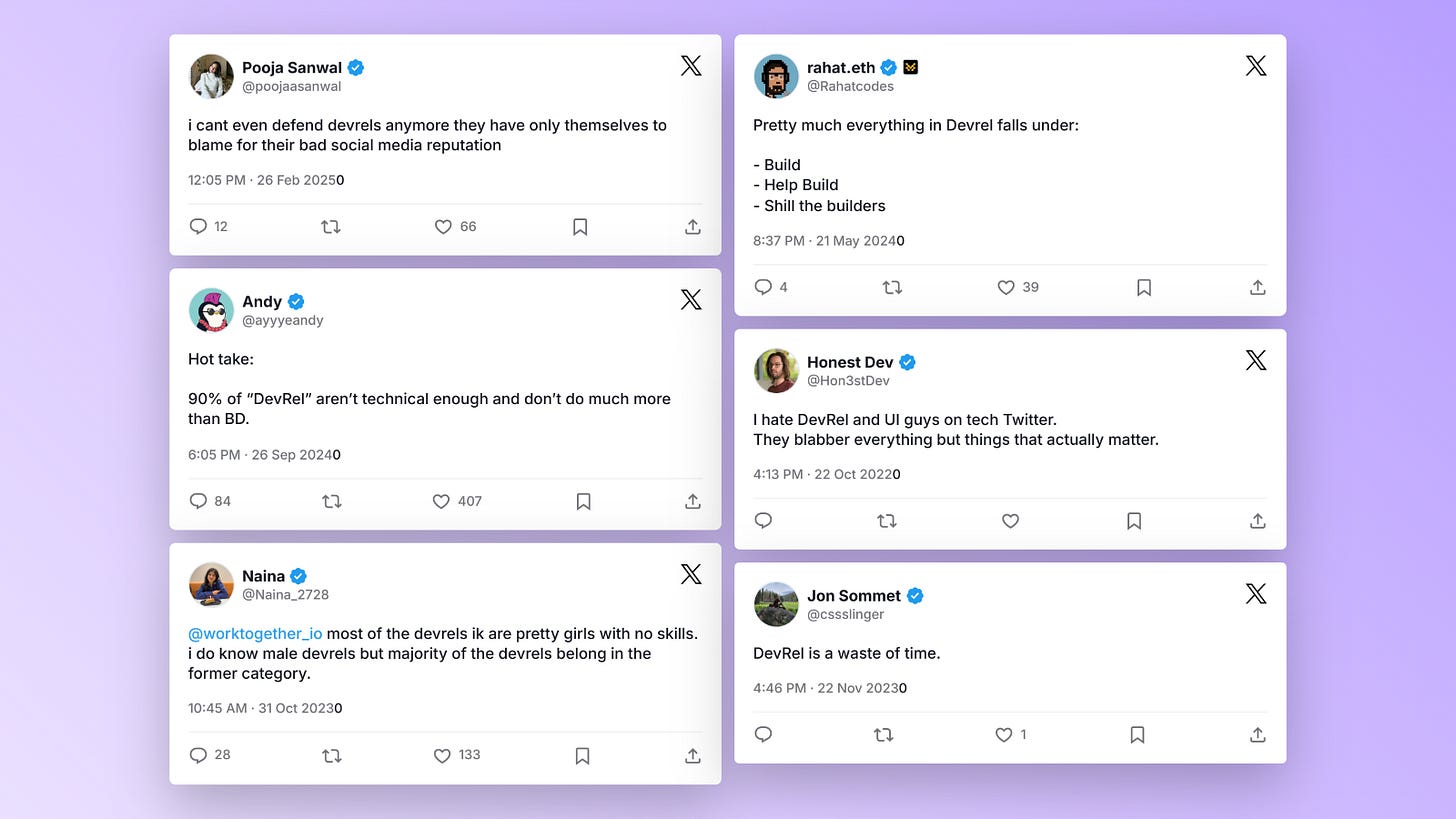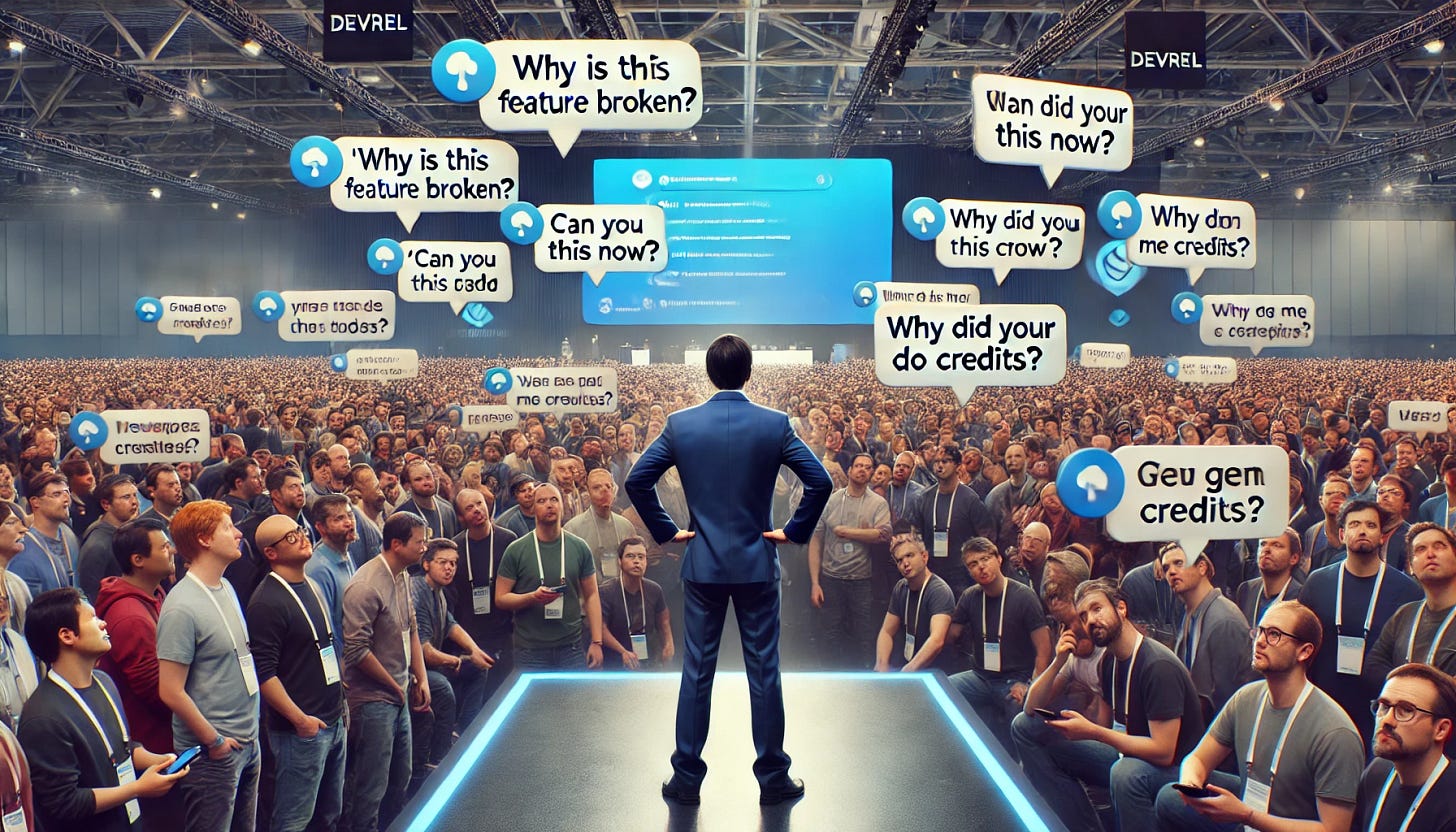As someone who has spent the last 3.5 years as a DevRel professional, a significant part of my work revolves around social platforms: X (I’m just going to call it Twitter), LinkedIn, Instagram, Reddit, etc. In fact, any online space with a developer community is a place where my peers and I engage, interact, and create content. But every now and then, social media reminds us of its “double-edged nature”—a space where people turn against us, misinterpret our work, or question our role and existence altogether.
Now, I don’t hate any of these opinions (a couple of these folks are, in fact, friends). The “ick” that DevRel as a profession is sometimes perceived with on Twitter isn’t without reason. Therefore, in this issue, I want to explore why social media is so integral to DevRel, why we spend so much time here, and the problems we face behind the scenes.
The Burdens of Doing DevRel on Social Media 😩
Social media is a powerful tool in Developer Relations (DevRel). It helps us build connections, share knowledge, and engage with the developer community. But when our role makes us public figures representing a company, there’s a tricky balance to maintain. It brings upon us certain challenges, which are mentioned below.
1. Our Personal Voice vs. Our Company’s Message
As DevRel professionals, we juggle two identities online—our personal, authentic selves and our roles as representatives of a company. On one hand, we want to be real, relatable, and human. We might want to share a humorous take on a frustrating debugging session or offer an unfiltered opinion on the latest tech trend. On the other hand, every post we make is seen through the lens of our company’s brand. Even when we think we’re just speaking for ourselves, others may interpret our words as carrying official weight.
This dual role means we must always consider how our words could be perceived. Misinterpretations can lead to confusion, backlash, or even harm to the company's reputation. Striking the right balance between personal authenticity and corporate responsibility is an ongoing challenge that requires constant awareness and adjustment.
2. The Internet Never Forgets
We’ve all been there, posting something in the heat of the moment and then second-guessing it later. While deleting a tweet or post might seem like a quick fix, the truth is that nothing on the internet truly disappears. Screenshots, archived pages, and even automated bot accounts can ensure that anything we say remains accessible long after we’ve tried to erase it.
For DevRel professionals, this means that a single misstep can have lasting consequences. Even well-intentioned remarks can be taken out of context, resurfacing at unexpected times. This creates an ongoing challenge of maintaining a professional yet authentic presence while minimizing the risk of reputational harm.
3. Social Media Metrics Aren’t the Whole Story
In an era where numbers dominate our online interactions, it’s easy to fall into the trap of equating success with high follower counts, likes, and retweets. After all, the sweet cha-chings of Twitter notifications excite us, don’t they?
The reality is that engagement metrics often don’t tell the full story. A viral tweet or meme might bring temporary attention, but it doesn’t necessarily lead to meaningful developer adoption or engagement. The pressure to chase metrics can distract from true value creation, making it difficult to measure the real impact of DevRel efforts.
4. The Glory Burden Of Being the Face
When we work in DevRel, we often become one of the most recognizable faces of our company within the developer community. This visibility has many advantages—developers trust us, seek our insights, and look to us as a source of guidance. However, it is more burden than glory.
If our company makes an unpopular decision, there’s an outage, or a feature doesn’t work as expected, we’re likely to hear about it (often in our mentions, replies, and even personal messages). Developers may also assume we have internal influence and might ask us for special favors, like fast-tracking feature requests or granting extra credits. The weight of these expectations can be overwhelming and difficult to manage.
5. The Pressure to Always Be Online
Social media is an incredibly powerful tool for DevRel, but it’s easy to fall into the trap of feeling like we must always be online. The expectation to post daily, join every Twitter Space, answer DMs at all hours, and stay on top of every discussion can quickly become overwhelming.
This expectation can lead to burnout, decreased productivity, and even anxiety over missing important discussions. The challenge lies in finding a balance between being actively engaged with the community and maintaining a sustainable workflow and personal well-being.
Practical Advice for DevRel Professionals on Social Media 🙇
Navigating social media as a DevRel professional can be overwhelming, but there are ways to make it more effective and sustainable. Here are a few guiding principles:
1. Stay Authentic, But Be Mindful
Authenticity is important, but so is being mindful of our position. Before posting, we should ask ourselves:
Does our comment align with our role?
Could it be misinterpreted as an official statement?
It’s important to strike a balance. We can be human, but being responsible ensures we don’t put our company in an awkward position.
2. Focus on Impact, Not Just Numbers
A viral meme might get attention, but a well-written guide that helps a developer build something is far more valuable. Many great DevRel professionals start with small followings and grow their influence by consistently providing value (I had less than 2000 followers on Twitter when I joined Appwrite). Instead of chasing clout, we should prioritize meaningful contributions to the developer community.
3. Think Before You Post
Before posting, it’s useful to reflect:
Will this be understood the way we mean it?
Could this resurface in a way we don’t intend?
Is this something we’d be comfortable defending a year from now?
Being thoughtful about our online presence isn’t about self-censorship; it’s about protecting our credibility. A moment of consideration before posting can prevent long-term misunderstandings.
4. Listen, Empathize, and Redirect
When our company makes an unpopular decision, or an outage occurs, we can expect to see it in our mentions. Developers might even message us personally for customer support issues.
Instead of taking everything upon ourselves, we should listen, empathize, and guide people to the right channels. We can be the bridge between the community and our company, but we’re not personally responsible for everything that happens internally.
5. Use Social Media Intentionally
To keep social interactions positive and productive, we should establish boundaries:
Set specific times for checking Discord, Twitter, or forums.
Avoid getting dragged into unproductive debates.
Take breaks; our job isn’t to be available 24/7.
Using social media with intention, whether to engage, learn, or share, ensures that it remains an asset rather than a source of burnout. If we exhaust ourselves, we won’t be able to help anyone effectively.
Finding the Right Balance 🤝
Dealing with this “DevRel–social media conundrum” is all about striking the right balance. Social platforms are an incredible resource for building relationships and staying connected, but they shouldn’t dictate our every move.
It’s important to engage meaningfully but also to set limits. Put the phone down when needed. Think before you tweet. Be kind, be real, and focus on impact over impressions. If we can approach social media with intentionality, it can remain one of our strongest allies in DevRel—without turning into a source of stress.









